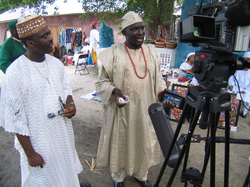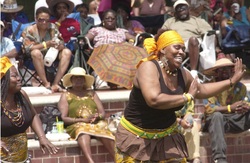ISLAND PACKET. Hilton Head, S.C

40 years later African Village still stands.
More than 35 years later, Iya Oba Adaramola still remembers the night in 1975 she turned off U.S. 21 to begin a new life with hundreds of others in the woods in Sheldon.
"We came in the middle of the night," Adaramola said. "The road was not as wide as it is now, and the trees hung over the road and met in the middle. I thought to myself, 'I'll be leaving in the morning.' When I woke up the next morning, it was so beautiful and peaceful. I didn't leave."
Adaramola is one of about 25 people still living at the Oyotunji African Village in Sheldon, which celebrates its 40th anniversary this year.
The village was founded in 1970 by Oba Adefunmi I -- a Detroit native born as Walter Eugene King -- and fashioned for African-Americans around the West African Yoruba culture that originated in Nigeria.
Adaramola, who is known as the village's queen mother and taught in the village's school, said a chance to re-connect with her heritage brought her from New York City to the remote 10-acre compound in 1975, and that keeps her and others there now.
"I was looking for peace and contentment and just gravitated toward this place," Adaramola said.
The village has long been a place of curiosities -- animal sacrifices, ritual facial scarring and the polygamy of Oba Adefunmi I -- and once drew national attention, including a crew from "60 Minutes" in 1986.
Oba Adefunmi I's claim that his village was an independent nation, not part of the United States, further fueled speculation the Oyotunji community was evading taxes or harboring a cult. Adaramola scoffs."The traditions we have, the customs we practice, this is an African village. This is how we would be living had we not been taken from Africa," Adaramola said. Adefunmi died in February 2005 at 76. His son now serves as the village's oba, or king.
At one point, Oyotunji was home to about 200 people, but the population has dwindled in recent years. Adaramola said the rigors of life within the self-sustained village were largely to blame for the decline."At first, it was a thrill," Adaramola said. "Like, 'Wow, this is an African village where we can practice African customs, take African names and speak an African language.' But it wasn't easy. We didn't have electricity for a while. You had to chop wood, heat your home and feed your children."Oyotunji suffered another setback last year after the death of Chief Adenibi S. Edubi Ifamuyiwa Ajamu, a Chicago native who was the second man to arrive at the village. Ajamu was a chief and elder priest before his death in December.Adaramola said Oyotunji has rebounded from Ajamu's death, and those living there continue their mission of keeping the Yoruba culture alive in the Lowcountry.
"It's always difficult to lose a member of the community, but we're taught that there is a line of communication between the living and the dead," Adaramola said. "We can keep that line of communication open by making offers to them. They're buried here, so they're always a part of us and with us."
More than 35 years later, Iya Oba Adaramola still remembers the night in 1975 she turned off U.S. 21 to begin a new life with hundreds of others in the woods in Sheldon.
"We came in the middle of the night," Adaramola said. "The road was not as wide as it is now, and the trees hung over the road and met in the middle. I thought to myself, 'I'll be leaving in the morning.' When I woke up the next morning, it was so beautiful and peaceful. I didn't leave."
Adaramola is one of about 25 people still living at the Oyotunji African Village in Sheldon, which celebrates its 40th anniversary this year.
The village was founded in 1970 by Oba Adefunmi I -- a Detroit native born as Walter Eugene King -- and fashioned for African-Americans around the West African Yoruba culture that originated in Nigeria.
Adaramola, who is known as the village's queen mother and taught in the village's school, said a chance to re-connect with her heritage brought her from New York City to the remote 10-acre compound in 1975, and that keeps her and others there now.
"I was looking for peace and contentment and just gravitated toward this place," Adaramola said.
The village has long been a place of curiosities -- animal sacrifices, ritual facial scarring and the polygamy of Oba Adefunmi I -- and once drew national attention, including a crew from "60 Minutes" in 1986.
Oba Adefunmi I's claim that his village was an independent nation, not part of the United States, further fueled speculation the Oyotunji community was evading taxes or harboring a cult. Adaramola scoffs."The traditions we have, the customs we practice, this is an African village. This is how we would be living had we not been taken from Africa," Adaramola said. Adefunmi died in February 2005 at 76. His son now serves as the village's oba, or king.
At one point, Oyotunji was home to about 200 people, but the population has dwindled in recent years. Adaramola said the rigors of life within the self-sustained village were largely to blame for the decline."At first, it was a thrill," Adaramola said. "Like, 'Wow, this is an African village where we can practice African customs, take African names and speak an African language.' But it wasn't easy. We didn't have electricity for a while. You had to chop wood, heat your home and feed your children."Oyotunji suffered another setback last year after the death of Chief Adenibi S. Edubi Ifamuyiwa Ajamu, a Chicago native who was the second man to arrive at the village. Ajamu was a chief and elder priest before his death in December.Adaramola said Oyotunji has rebounded from Ajamu's death, and those living there continue their mission of keeping the Yoruba culture alive in the Lowcountry.
"It's always difficult to lose a member of the community, but we're taught that there is a line of communication between the living and the dead," Adaramola said. "We can keep that line of communication open by making offers to them. They're buried here, so they're always a part of us and with us."
Island packet Hilton Head, S.C

Photo: A member of the Yoruba Dancers, part of the Yoruba Drummers and Dancers from the Oyotunji African Village in Sheldon, entertained a large and enthusiastic crowd with an authentic African dance at the Gullah Festival Saturday at Beaufort's Henry C. Chambers Waterfront Park.
BOB SOFALY/The Beaufort Gazett
BOB SOFALY/The Beaufort Gazett
Most Frequently Visited PagesRequest an International Invitation Letter
|
Contribute to OAV |
Website: http://www.oyotunji.org Email: [email protected] Hours of Operation: 11 a.m.- Dusk Location: 56 Bryant Lane Seabrook, SC 29940 |
OYOTUNJI.ORG

